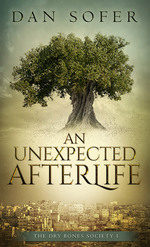 An Unexpected Afterlife
An Unexpected Afterlife
by Dan Sofer
Series: The Dry Bones Society, Book One
Kindle Edition, 285 pg.
2017
Read: October 23, 2017

Moshe Karlin wakes up after his birthday party got out of hand — so out of hand that he doesn’t remember drinking as much as he clearly did, he doesn’t remember what happened to his clothes, or why he’s in the cemetery on the Mount of Olives. He makes it home, crawls into bed and finds another man in his bed with his wife. The man (his best friend and business partner, Avi) and his wife are pretty freaked out — as is Moshe. Moshe because that’s the last thing he expected to find in his bed, and the other two are freaked out because Moshe has been dead for 2 years.
Moshe might be alive again, but his life is gone — his business is a wreck, his daughter doesn’t recognize h im, and his wife won’t talk to him. But his neighbor a rabbi will listen to him, and talks to him about the believes around the Resurrection. They soon discover another person claiming to be resurrected — she has no memory about anything, not her name, cause of death, anything. The two bond quickly and begin working together to provide for their new lives, to understand them, and to try to get Moshe’s family back. Along the way, they bring in more of the Resurrected to help out. It’s not a large, general resurrection at work, or even a stream of them — but it is a decent trickle.
Their rabbi friend tries to get them in front of the religions leaders in the culture, but are rebuffed. Next thing they’re fighting to survive. They have no legal standing, a need for money and shelter, jobs, and some way to make people pay attention to their claims.
There’s a prophet running around, too. An accident put shim in the hospital and takes him off the chessboard for most of the game, but he’s aware of Moshe and his friends as well as knowing what that means for the world. If only the medical establishment would let him get to work. His character is plenty interesting and I found myself grinning at the situations he found himself in.
The writing is crisp, nothing too flashy, but it’s more enough to keep you reading. Sofer imbues his characters with a good deal of humanity, of hope. There’s a splash of humor that helps a lot, too. I’m not sure why Moshe is so taken with his wife, but he is — and you have to admire his dedication to her (and if we had some more time with her, I’d probably agree with him). The reaction he has to his daughter not recognizing him is hard to take. All of the resurrected are having difficulty fitting back in to the world — especially when they try to fit in to their old lives — and that’s a very interesting thing to see play out.
I’m really uncomfortable about the subject matter — it’s one thing for McGuire or Hearne to pillage myths of the Tuatha Dé Danann or Riordan to pillage the Greek/Roman/Egyptian/Norse stories. But it’s something very different for someone to utilize figures and beliefs of a religion like Judaism — especially when it’s not just beliefs, but utilizing actual figures from the religion for your own means seems to cross a line to me (and yes, I’d say the same about Christian fiction, for example). I’m not saying Sofer’s wrong to do this, or that he does so with any measure of discernible disrespect, but I figured I have to throw up a warning.
If you can get past the use of the religious characters/events, I’d expect that you could like this one. I’m not sure I can get behind it, but it’s good, I can tell you that.
Disclaimer: I received this book from the author in exchange for this post and my honest opinion — my thanks to him for this.
—–



2 Pingbacks